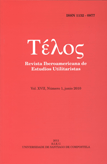Conflict, socialism, and democracy in Mill
plugins.themes.xejournal.article.main
Resumo
Mill’s socialism and democratic theory have led some scholars to accuse him of trying to eliminate conflict from political life. Whereas Graeme Duncan has averred that Mill’s socialism aims to institute a completely harmonious society, James Fitzjames Stephen has contended that Millian democracy sought to evacuate conflict from political discussion. This article reconstructs both critiques and argues they are imprecise. Even if disputes motivated by redistribution of material goods would no longer exist in an egalitarian society, conflicts driven by resentment over social reputation would keep the flame of conflict burning in a Millian socialist community. Moreover, a close reading of Considerations on Representative Government shows that Mill knew that no amount of political discussion is able to make conflicting opinions disappear. According to him, conflict is unavoidable in democratic politics because citizens analyse political issues from different social perspectives. Mill’s goal was not to eliminate conflict, but rather to regulate it in such a way as to bring about its attendant benefits, namely, progress and self-development.







